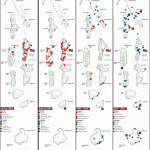Tourism minister Ahmed Adeeb has said he expects an increase in Chinese investment in Maldives tourism following the lease of a second island for resort development to Chinese companies.
The joint venture -between China’s Guandong Beta Ocean and a Maldivian company – were awarded Vaavu Atoll Kunaavashi this week to develop a five-star luxury resort with some 142 rooms.
“More Chinese investors will follow. There is a lot of interest, from Sri Lankan and Singapore companies as well,” Adeeb told Minivan News today.
The tourism ministry in May also signed an MOU with the state-owned China Machinery Engineering Corporation (CMEC) to develop Thaa Atoll Kalhufahalafushi as a resort.
Chinese tourists accounted for nearly one third of arrivals in 2014 with a total of 363,626 arrivals. China now represents the single biggest source market for tourists in the Maldives with a 30 percent market share.
On Monday, Adeeb said China’s Ambassador to the Maldives, Wang Fukang, had pledged to increase Chinese arrivals to one million. The venture would require extensive infrastructure developments, such as airport developments and building new resorts to increase the total bed capacity of the country, he said.
Mifzal Ahmed, the director of strategy and business development at privately owned airline Mega Maldives, said he hoped “this is the start of a full wave of such investment in the country, and the Government should be congratulated for the role they have played in making these investments happen.”
Mega Maldives pioneered direct flights from Maldives to China in 2009. It operates four to five flights a week from Beijing, Shanghai, and Hong Kong.
“We have long argued that the demands from the Chinese tourists to the Maldives are at times a little different from the European traveller. Therefore, getting investors who understand the mentality of these tourists is a very good thing,” he added.
Mauroof Zaki, the secretary general of the Tourism Employees Association of the Maldives (TEAM), noted the importance of equipping Maldivian staff with the skills to cater to an influx of Chinese tourists.
“We need more language classes on Mandarin or training on food and beverage services to Chinese tourists,” he said.
However, he said he was concerned that Chinese tourists may not be as conscientious as European tourists on labor rights, human rights and the environment.
“When ethical tourists come to the Maldives, it improves the work environment for Maldivian staff, for example, tourists pushed for the equitable distribution of service charge to staff,” he said.
A resort owner, who wished to remain anonymous, said Chinese developers must take care to develop international resorts. “Does the Chinese traveler want to be on an island by themselves? From what I’ve seen, they want to be among others, and do not like to be segregated.”
The Maldives Association of Tourism Industries (MATI) was not available for comment at the time of going to press.
The Maldives reached the one million tourist arrival mark in 2013. In 2014, the Maldives welcomed 1.2million arrivals, and the government hopes to see 1.4million arrivals in 2014.
The tourism ministry last week launched the “Visit Maldives Year 2016” campaign. The US$10million will see festivals and trade events, and award free holidays throughout the year. The Maldives has also been designated as the partner host country for the ITB fair in Berlin in 2016.
According to Forbes, Chinese investment in the global hospitality industry has seen a surge in the last two years. The trend started when Chinese Dalian Wanda group announced plans of investing a US$ 1.09 billion luxury hotel in London.
Since then, Chinese companies has announced a US$ 900 million skyscraper in Chicago, a US$ 1.95 billion acquisition of New York’s Waldorf Astoria, and a US$ 399 million hotel in Sydney.
Maldives has become a main attraction for Chinese travelers, with South China Morning Post saying, the country has topped travel lists for Chinese travelers, with the country being promoted in China’s media as an “approved destination” by the Communist Party government.






